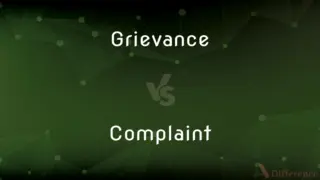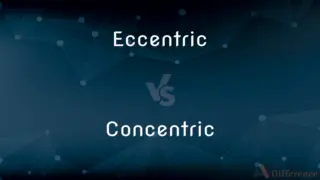Tactician vs. Strategist — What's the Difference?
Edited by Tayyaba Rehman — By Fiza Rafique — Updated on October 24, 2023
A "tactician" specializes in immediate actions or maneuvers, while a "strategist" focuses on long-term plans or objectives.

Difference Between Tactician and Strategist
Table of Contents
ADVERTISEMENT
Key Differences
Both "tactician" and "strategist" refer to individuals skilled in planning, but their scopes differ. A tactician excels in creating short-term, immediate actions or maneuvers, particularly in specific situations. On the other hand, a strategist is concerned with broader, long-term objectives, envisioning a larger picture.
Consider the realm of warfare: a tactician might decide the best immediate placement of troops in a battle, emphasizing the best response to the current situation. In contrast, a strategist would consider the entire war campaign, determining which battles to fight, when, and why.
In the corporate world, a tactician might determine the best approach to boost this month's sales, while a strategist might devise a five-year plan to expand the company's market share. It's the difference between thinking on-the-spot and long-term planning.
While tacticians are valuable for their ability to respond swiftly and appropriately to immediate challenges, strategists are crucial for setting the direction and ensuring sustained success over extended periods.
In summation, while there's an overlap in the roles of a tactician and a strategist, the primary distinction lies in the time frame and scope of their planning and execution.
ADVERTISEMENT
Comparison Chart
Time Frame
Short-term
Long-term
Scope
Immediate actions or maneuvers
Overall plan or objectives
Field of Expertise
Tactics
Strategy
Perspective
Narrow, situational
Broad, holistic
Example Usage
Military formations in a battle
War campaigns
Compare with Definitions
Tactician
An individual who excels in situational problem-solving.
The company's lead tactician found a quick fix to the software issue.
Strategist
An expert in strategy.
As a strategist, he had a five-year vision for the company.
Tactician
Someone skilled in detailed actions or maneuvers.
The basketball coach was a brilliant tactician during tense moments.
Strategist
A person adept at seeing the bigger picture.
The marketing strategist analyzed industry trends to position the brand.
Tactician
A person adept at securing immediate advantages.
As a political tactician, she made moves that constantly caught her opponents off guard.
Strategist
An individual who excels in formulating overarching plans.
The chess grandmaster, known as a strategist, always thought ten moves ahead.
Tactician
Someone proficient in devising or executing specific, immediate plans.
The tactician deployed the troops to secure the hill strategically.
Strategist
Someone skilled in planning for long-term goals or objectives.
The military strategist devised a campaign to reclaim lost territories.
Tactician
An expert in tactics.
As a tactician, he knew how to move his chess pieces effectively.
Strategist
Someone proficient in devising comprehensive plans that ensure sustained success.
The campaign's lead strategist was behind its innovative messaging.
Tactician
One who is skilled in the planning and execution of military tactics.
Strategist
A strategist is a person with responsibility for the formulation and implementation of a strategy. Strategy generally involves setting goals, determining actions to achieve the goals, and mobilizing resources to execute the actions.
Tactician
A clever maneuverer.
Strategist
One who is skilled in strategy.
Tactician
A person skilled in the planning and execution of tactics.
Strategist
A person who devises strategies.
Tactician
One versed in tactics; hence, a skillful maneuverer; an adroit manager.
Strategist
One skilled in strategy, or the science of directing great military movements.
Tactician
A person who is skilled at planning tactics
Strategist
An expert in strategy (especially in warfare)
Common Curiosities
Does a strategist always look years into the future?
Not necessarily, but they focus on long-term objectives or broader plans.
Is a tactician's role less important than a strategist's?
No, both roles are vital; they just operate on different time frames and scopes.
In business, would a tactician be more like a manager?
Often, yes. Managers might act as tacticians, handling immediate issues, while executives might be strategists.
Is a tactician only concerned with the present moment?
Primarily, yes. A tactician focuses on immediate actions or responses.
Does "tactical" mean "related to a tactician"?
Yes, "tactical" pertains to tactics or the role of a tactician.
Who might need a tactician on their team?
Anyone facing immediate challenges or needing quick solutions.
Can one person be both a tactician and a strategist?
Absolutely. Many leaders possess skills in both tactics and strategy.
Is a strategist always thinking about the future?
Predominantly, yes. They're concerned with future outcomes and directions.
Can strategy change based on tactics?
Yes, if immediate actions yield unexpected results, the strategy might need adjustment.
In a company, who would typically be the key strategist?
Often, top executives or CEOs, but it can vary based on the organization.
Can tactics sometimes inform strategy?
Certainly. Immediate outcomes can influence long-term plans.
Are these terms only used in military contexts?
No, they're used in various fields, including business, sports, and politics.
How does "strategic planning" relate to a strategist?
It's the process they use to define and execute long-term goals.
Can a tactician think long-term?
While their primary focus is short-term, they can consider long-term implications.
Would a football coach be more of a tactician or strategist?
Both. They plan game strategies and make on-the-spot tactical decisions.
Share Your Discovery

Previous Comparison
Grievance vs. Complaint
Next Comparison
Eccentric vs. ConcentricAuthor Spotlight
Written by
Fiza RafiqueFiza Rafique is a skilled content writer at AskDifference.com, where she meticulously refines and enhances written pieces. Drawing from her vast editorial expertise, Fiza ensures clarity, accuracy, and precision in every article. Passionate about language, she continually seeks to elevate the quality of content for readers worldwide.
Edited by
Tayyaba RehmanTayyaba Rehman is a distinguished writer, currently serving as a primary contributor to askdifference.com. As a researcher in semantics and etymology, Tayyaba's passion for the complexity of languages and their distinctions has found a perfect home on the platform. Tayyaba delves into the intricacies of language, distinguishing between commonly confused words and phrases, thereby providing clarity for readers worldwide.












































